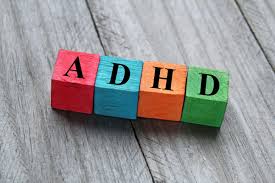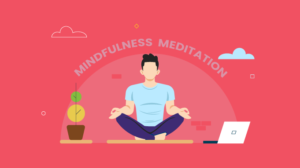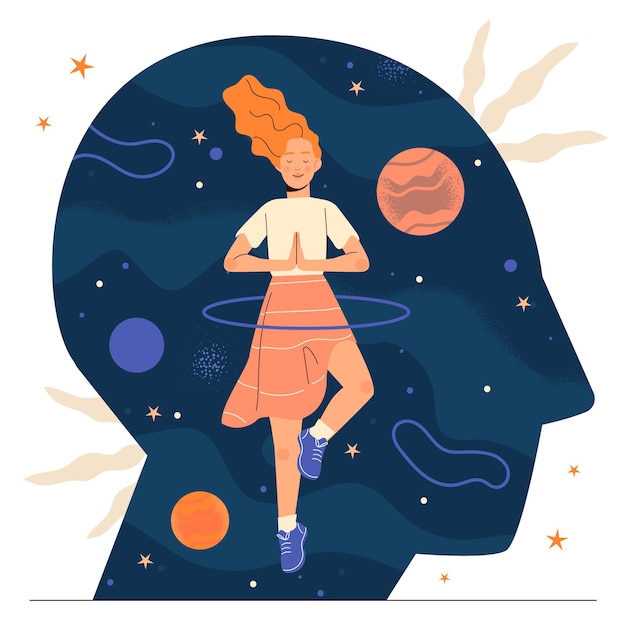If you are one of the many people who suffer from ADHD, you know that it can be a challenge to focus and concentrate on tasks. Mindfulness meditation has been shown to be an effective way to improve attention and concentration in people with ADHD. In this blog post, we will discuss the benefits of mindfulness meditation for people with ADHD, and we will provide a guide on how to get started with mindfulness meditation.
Contents
Defining ADHD
 Often, a general assumption is that ADHD is only about being unable to focus. However, ADHD is a brain disorder that includes a pattern of inattention and/or hyperactivity-impulsivity that interferes with functioning or development. It is a neurological condition that is characterized by problems with executive functioning. This can include difficulties with organization, time management, planning ahead, and controlling impulses. ADHD occurs in both children and adults, though it is most commonly diagnosed in childhood.
Often, a general assumption is that ADHD is only about being unable to focus. However, ADHD is a brain disorder that includes a pattern of inattention and/or hyperactivity-impulsivity that interferes with functioning or development. It is a neurological condition that is characterized by problems with executive functioning. This can include difficulties with organization, time management, planning ahead, and controlling impulses. ADHD occurs in both children and adults, though it is most commonly diagnosed in childhood.
Defining Mindfulness
Mindfulness has emerged as a rather popular concept in recent years. Jon Kabat-Zinn, a professor of medicine emeritus at the University of Massachusetts Medical School, defines mindfulness as “paying attention in a particular way: on purpose, in the present moment, and non-judgmentally.” In other words, mindfulness is about being aware of your thoughts and feelings in the present moment, without judgment.
This practice has been integrated with therapeutic interventions such as therapy and counseling in order to help people who suffer from conditions like anxiety, depression, and chronic pain. A growing body of research has also begun to explore the potential benefits of mindfulness meditation for people with ADHD.
How Mindfulness Helps ADHD
 As we know by now, ADHD primarily concerns with executive functioning skills. A study that was conducted in 2014, looked at the effects of mindfulness-based training on executive functioning in a group of adults with ADHD. The results indicated that those who underwent the mindfulness-based training showed significant improvements in their executive functioning skills, compared to those who did not receive the intervention.
As we know by now, ADHD primarily concerns with executive functioning skills. A study that was conducted in 2014, looked at the effects of mindfulness-based training on executive functioning in a group of adults with ADHD. The results indicated that those who underwent the mindfulness-based training showed significant improvements in their executive functioning skills, compared to those who did not receive the intervention.
Another study found that mindfulness meditation can help to improve symptoms of ADHD, such as inattention and impulsivity. In this study, a group of children with ADHD were given a mindfulness-based intervention, which included training in mindfulness meditation. The results showed that the children who received the intervention had significantly reduced symptoms of ADHD, compared to those who did not receive the intervention.
These studies do make it obvious that mindfulness meditation can help to improve symptoms of ADHD. But how does it work?
It is believed that mindfulness meditation helps to improve attention and concentration by teaching people with ADHD to focus on the present moment. When you suffer from ADHD, your mind is constantly racing, and it can be difficult to focus on one task for an extended period of time. Mindfulness meditation helps to train your mind to focus on the present moment, which can help to improve your attention and concentration.
In addition, mindfulness meditation can help to reduce stress and anxiety, which are common comorbidities of ADHD. A study that was conducted in 2016, looked at the effects of mindfulness meditation on stress and anxiety in a group of adults with ADHD. The results showed that those who underwent the mindfulness-based intervention had significantly reduced levels of stress and anxiety, compared to those who did not receive the intervention.
So, if you are looking for a way to improve your attention and concentration, or to reduce your stress and anxiety levels, then mindfulness meditation may be worth a shot!
Techniques Used
Mindfulness is a rather umbrella term that encompasses a wide variety of techniques and practices. The most common form of mindfulness meditation is called mindfulness-based stress reduction (MBSR). MBSR was developed by Jon Kabat-Zinn, and it is a secular program that can be used to help people who suffer from conditions like anxiety, depression, and chronic pain.
MBSR consists of eight week-long sessions, and it includes a variety of components such as mindfulness meditation, yoga, and group discussions.
Some other popular and effective techniques that fall under the mindfulness umbrella include:
- Focused attention: This technique involves focusing on a single object, such as your breath, for a period of time.
- Journaling: This involves writing down your thoughts and feelings in a journal, without judgment.
- Visualization: This involves picturing a calm and peaceful scene in your mind.
- Animal assistance: This involves using an animal, such as a dog or cat, to help you focus on the present moment.
- Music: This involves listening to calming and relaxing music, without judgment.
- Progressive muscle relaxation: This involves tensing and relaxing different muscle groups in your body.
- Open monitoring: This technique involves paying attention to all of the thoughts, feelings, and sensations that you experience, without judgment.
- Body scan: This technique involves paying attention to all of the sensations in your body, from head to toe.
- Walking meditation: This technique involves paying attention to your breath and your steps as you walk.
These are just a few of the many mindfulness techniques that are available. If you are interested in exploring mindfulness further, then there are plenty of resources available online or in your local library.
Advantages
We already are aware of the studies that testify the advantages of mindfulness on ADHD. However, let us look at some of the advantages in detail.
- It helps to train your mind to focus on the present moment, which can help to improve your attention and concentration.
- It can help to reduce stress and anxiety, which are common comorbidities of ADHD.
- Moreover, it provides for a sense of control and calm in the midst of a often hectic and chaotic life.
- The added benefit of mindfulness is that it can be practiced anywhere and at any time, making it a convenient and accessible tool for managing ADHD symptoms.
- Lastly, it is a secular program that can be used to help people who suffer from conditions like anxiety, depression, and chronic pain.
So these were some of the advantages of mindfulness for ADHD! With these points in mind, we hope you will be encouraged to give mindfulness a try.
Limitations
Just like with any other treatment, there are certain limitations to mindfulness for ADHD.
- For one, it is not a cure-all and will not work for everyone. It takes time and effort to learn and practice mindfulness, and it may not be the right fit for everyone.
- Secondly, while it can help to improve attention and concentration, it cannot replace traditional treatments like medication and behavioral therapy.
- Moreover, it may sometimes be difficult to find the time and space to practice mindfulness, especially if you have a busy lifestyle.
- Some people may also find the practice of mindfulness to be boring or tedious.This can be because of the slow and monotonous nature of the practice.
- Lastly, it is important to remember that mindfulness is not a quick fix and takes time and practice to see results.
So those were some of the advantages and limitations of mindfulness for ADHD! If you are thinking of trying mindfulness to help manage your ADHD symptoms, remember to speak with your doctor first and find a qualified mindfulness teacher to help get you started.
Tips To Get Started
 Although mindfulness is a pretty flexible practice that can be done anywhere, there are still a few things you can do to set yourself up for success.
Although mindfulness is a pretty flexible practice that can be done anywhere, there are still a few things you can do to set yourself up for success.
- It can be helpful to find a quiet and comfortable place to sit or lie down, where you will not be interrupted.
- You may want to set a timer for the duration of your practice, so that you don’t have to worry about the time.
- It can also be helpful to practice with a group or with a mindfulness app, so that you can get guidance and support.
- If you are new to mindfulness, it is important to start off slow and gradually increase the length of your practice as you become more comfortable with it.
- For better supervision and guidance, sign up for a class. There are various websites and apps that offer mindfulness classes.
So those were some tips to get started with mindfulness for ADHD! If you are thinking of trying mindfulness, remember to start off slow and gradually increase the length of your practice as you become more comfortable with it. With a bit of time and effort, you may be surprised at the results.
Alternatives
Mindfulness is just one of the many possible options available to help people with ADHD. There are various other interventions that have been found to be effective in managing ADHD symptoms. Some of these include the following.
- Cognitive behavioral therapy: This is a type of therapy that helps to change negative thinking patterns and behaviors. It can be an effective treatment for ADHD, as it can help to improve symptoms like impulsivity and hyperactivity.
- Medication: Stimulant medications are often prescribed to people with ADHD, as they can help to improve focus and concentration. However, it is important to speak with a doctor before starting any new medication, as there can be side effects.
- Diet: There are some evidence-based dietary interventions that can help to improve ADHD symptoms. This includes eliminating certain foods from your diet, like sugar and artificial additives.
- Supplements: Some people with ADHD may benefit from taking certain supplements, like omega-three fatty acids. However, it is important to speak with a doctor before starting any new supplement, as there can be side effects.
Those were some of the alternatives to mindfulness for ADHD! If you are thinking of trying one of these interventions, remember to speak with your doctor first to see if it fits your personal lifestyle.
Conclusion
To end our article, we can state that mindfulness is one of the many possible options available to help people with ADHD. While it does have some advantages, there are also some limitations to keep in mind. With that said, mindfulness is a pretty flexible practice that can be done anywhere, so it may be worth giving it a try! With a bit of time and effort, you may be surprised at the results. We hope you enjoyed this article and found it helpful!
If you or someone you know is looking for psychological help, Therapy Mantra is here for you. We are the leading providers of online therapy and counseling. Our team of highly trained and experienced therapists can provide assistance at the most affordable rates. Contact us today to learn more about our services. You may also visit our website to book an online therapy session or download our free Android or iOS app for more information.


